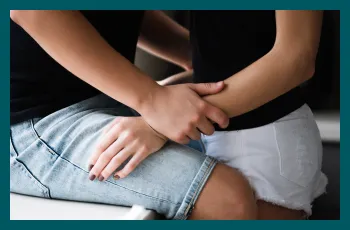How long does gastro last: symptoms, recovery, and prevention
Written by Dr Nelson Lau, MBBS FRACGP, GP & Digital Health Specialist.

Contents

There's nothing quite like the misery of gastroenteritis - whether you call it "gastro" or the stomach flu, it arrives unwelcome with its trademark symptoms: diarrhoea, nausea, vomiting, and those painful stomach cramps. While most of us can weather this storm at home, it's particularly challenging for children and the elderly who may need extra care and attention.
How long does it take to recover from gastro?
When gastro strikes, one of the first questions people ask is how long they'll be out of action for. The answer isn't one-size-fits-all, but typically viral gastro - the most common type - runs its course in one to three days, though some unlucky ones might find themselves battling symptoms for up to a week. Bacterial cases can be more stubborn, especially if antibiotics enter the picture. Throughout recovery, you'll likely experience ongoing symptoms like diarrhoea and fatigue, but they should gradually become less severe. The key players in your road to recovery are simple but crucial: plenty of fluids and adequate rest.How to avoid gastro when family has it?
When gastro infiltrates your household, it becomes a tactical operation to prevent its spread. The virus is notoriously contagious, but there are effective strategies to contain it. Frequent and thorough hand washing becomes your first line of defense - think of it as your personal force field against the virus. A thorough cleaning regime targeting high-touch surfaces like doorknobs, light switches, and bathroom fixtures with proper disinfectant creates another barrier of protection. The sick person should have their own designated towels, cups, and eating utensils - sharing is definitely not caring when it comes to gastro. And if you're the one who's sick, stay out of the kitchen. Food preparation is off-limits until you're well again.Experiencing these symptoms? Speak with a doctor within 15 minutes.
See a Doctor now
Available 24/7, across Australia.
When complications arise
While most gastro cases resolve themselves, complications can develop, particularly among vulnerable groups. Dehydration stands as the most serious threat, especially in young children and the elderly where fluid loss from both ends can quickly become dangerous. The body's delicate balance of electrolytes can also be disrupted, leading to weakness, dizziness, and even irregular heartbeats. In severe or prolonged cases, the body's ability to absorb nutrients may be compromised, potentially leading to malnutrition. Early recognition and management of these complications, primarily through careful rehydration and electrolyte replacement, can prevent more serious outcomes.Prevention: Your best defense
While completely avoiding gastro might be impossible, especially during community outbreaks, you can significantly reduce your risk through preventive measures. Regular hand washing, particularly before meals and after bathroom visits, remains your strongest ally. Safe food handling practices, including thorough cooking and prompt refrigeration of leftovers, create another layer of protection. In areas where water quality is questionable, sticking to bottled or boiled water can make a huge difference. Some countries also offer vaccines for certain types of viral gastroenteritis, particularly for children.Is there the fastest way to get rid of gastro?
Everyone wants a quick fix when gastro hits, but unfortunately, there's no magic cure. However, several strategies can help ease your journey through the illness. Small, frequent sips of water or electrolyte solutions help maintain hydration without overwhelming your sensitive stomach. As your appetite returns, the BRAT diet (bananas, rice, applesauce, and toast) provides gentle nourishment. Giving your body plenty of rest allows your immune system to focus on fighting the infection. During this time, it's wise to avoid dairy products and caffeine, which can aggravate your symptoms.When should a child seek medical attention for gastro?
Understanding when to seek medical attention can be crucial, especially for children and vulnerable adults. For children, persistent diarrhoea lasting more than a few days, high fever, signs of dehydration, or inability to keep fluids down warrant a doctor's visit. More severe symptoms like significant dehydration, blood in vomit or stool, unrelenting abdominal pain, or high fever that doesn't respond to medication require immediate emergency care.When should an adult seek medical attention for gastro?
Adults generally fare better with gastro but should still seek medical attention if symptoms persist beyond a few days, high fever develops, or signs of dehydration appear. Emergency care becomes necessary if severe dehydration sets in, characterised by confusion, rapid heart rate, or if there's blood in vomit or stool.Can an online doctor help via telehealth?
In today's connected world, telemedicine offers a convenient way to get medical guidance without leaving home. Virtual doctors can assess symptoms, provide rehydration advice, prescribe necessary medications, and determine if in-person care is needed. During these consultations, don't hesitate to ask about safe home management strategies, dietary restrictions, dehydration risks, and appropriate use of over-the-counter medications.The journey through
While gastro typically resolves on its own, it requires patience and proper care, especially when affecting children or vulnerable adults. Understanding the warning signs, maintaining good hygiene practices, and knowing when to seek help are essential tools in managing this common but challenging illness. Whether you choose virtual or in-person medical care, staying informed and prepared helps ensure a smoother recovery and reduces the risk of complications. Remember, this too shall pass, and with proper care and attention, you'll be back to normal before you know it.Need time off to recover? Get your medical certificate online within 15 minutes.
Request a medical certificate
Available 24/7, across Australia.
What we treat
- Cough
- Nausea & vomiting
- Fever
- Hayfever
- Fatigue
- Sore throat
- Acne
- Hair loss
- Gout
- Eczema
- Rosacea
- Sunburn
- UTI
- Erectile dysfunction
- Contraception
- Morning sickness
- Morning after pill
- Prostate health
- Anxiety
- Depression
- Stress
- Grief & loss
- Antidepressants
- Premature ejaculation
- Asthma
- Blood pressure
- Blood thinners
- Diabetes
- Cholesterol
- Migraines & headaches
- Allergies
- Body ache
- Heartburn & reflux
- Sleep disorder
- Pain relief
- Gastro
Related Articles
Disclaimer
This blog is for general informational purposes only and does not indicate that Hola Health provides all treatments or preventive measures mentioned. It is not intended to be a substitute for professional medical advice. Always seek the guidance of your doctor or other qualified health professional with any questions you may have regarding your health or a medical condition. For emergencies please immediately contact 000. Any medical topics discussed are intended to educate, not to imply availability through Hola Health.
 Facebook
Facebook  X
X  Copy Link
Copy Link



